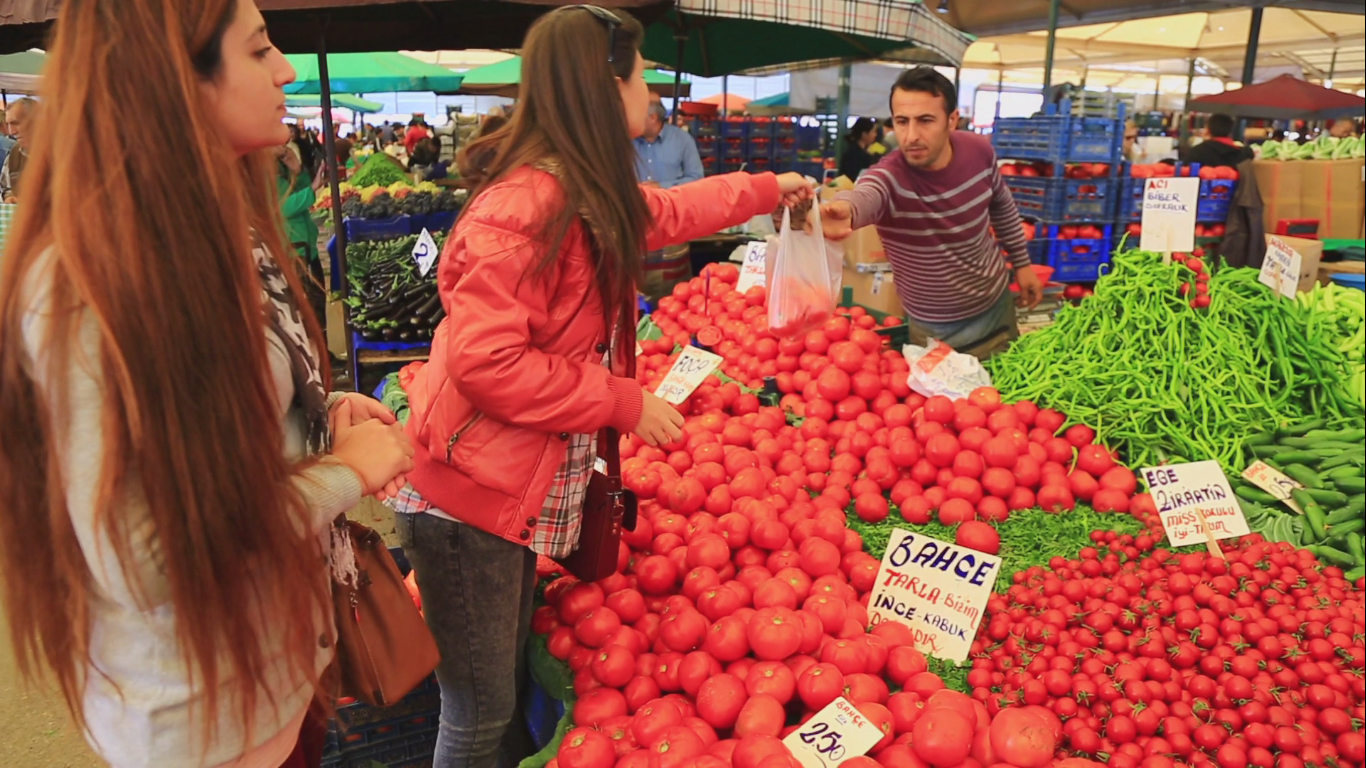In these 3 rd and 4 th videos, we tried to introduce the weekly street markets in Turkey and some common expressions and behaviors.
Weekly Street Markets
The street markets are the most popular locations for shopping in Turkey. Going to the street markets for a week and buying weekly supplies is an indispensable habit for Turkish people.
In all cities, towns and villages in Turkey, street markets are set up on certain days of the week. In fact, in large cities, various districts have street markets on different days. In these markets, shopping begins early in the morning, and continues until sundown.
Turkish people prefer buying vegetables and fruits from these street markets instead of supermarkets and that’s why they visit these markets specifically. The main reason behind this is the variety of fresh produce available in these markets with lower prices.
Another reason these markets are so popular is that they produce organic and local produce from local producers and farmers. Even some housewives sell objects or foodstuff they make at home.
Anything and Everything
Even though the street market is composed of vegetables and fruits, it’s also possible to see many other products. While some small markets only offer foodstuffs, you can also see different products on the street markets.
In Turkish, there is a saying ” no no ” (nothing’s unavailable) that is used for places where everything can be found. This expression is indeed quite suitable for street markets.
What Street Markets Sell?
You can see various kinds of products in these markets such as:
- A variety of fresh vegetables and fruits,
- Dried nuts and fruits,
- All kinds of spices,
- Dairy products
- Bread, variety of homemade food,
- Street food ( pancakes (a pastry similar to pancakes), pretzels, etc.)
- All kinds of clothes and shoes,
- Home textile products (towels, blankets, curtains …)
- Jewelry and knickknacks,
- Small household goods and kitchen utensils,
- Stationary and office supplies etc.
Ambience of the Street Market and Marketers
As the most typical example of street shopping in Turkey, weekly street markets are vibrant environments where different colors, sounds, tastes and smells converge.

For a typical Street Market environment, we can say that:
- Vendors shout to invite customers while selling their products. Every vendor has a style of their own. You can hear them repeating the same words constantly to their products.
- If you want to buy a product, you have to buy it. Customers can choose the vegetables or fruits one by one. (This may not be applicable in all parts of Turkey.)
- Buying a few fruits and vegetables is not an appropriate behavior in street markets. In these markets, produce is usually sold by kilo. But you can buy fruits and vegetables one by one in a supermarket.
- Most of the vendors enjoy offering samples to their customers. And they will not ask for money for this. Also, you do not have to buy something you sampled.
- In street markets, cash is used.
- You can see that the customers carry these bags called “the market car ” (shopping trolleys). Turkish people usually shop for the week ahead, and that’s why they buy many things from street markets and carry their purchases with these bags.
- Even though this is street shopping, especially in food purchases, it’s not common to haggle with vendors.
Common Phrases for Shopping
In “Street market” and “supermarket” videos, we also tried to highlight some common phrases used during shopping.
Even though these videos are related to the first topics of A1 (elementary) level, they also include examples on the request, suggestion and invitation modals with “may, can and let’s”. In most of the Turkish teaching programs, these modal structures are taught in A2 levels which make sense grammatically. However, students learn a foreign language, even in elementary level, using common phrases for “suggestion, request, asking for permission etc.”
This is also true for English. I believe that students should not wait until level A2 to learn and use sentences like “may I take it?”, “Can you give it?” Grammatical structure in my opinion is more beneficial.
In these chapters, we did not hand out scripts to vendors and natural actors. We asked them to always do.
The following are commonly used expressions:
- For suggestion and proposal, ” Let’s go (let’s go)”, ” Let’s (let’s do),” ” Let us (let’s give)”
- For approval ” would be (time)”, ” get (okay)”
- Can I get “For request and permission” ? (May I take it) “,” give? (Can you give it) “,” will you take it ? (Would you like to take it) “
- During shopping, vendors say ” Here’s (Welcome)”, ” Is there anything else? (Anything else?) “
And customers say ” Take it easy (take it easy)”, ” beneficial works (Have a nice working day)”.
Uses of ” Abi (Brother)” and ” Abla (Sister)”
While shopping at a weekly street market, we can hear that vendors and customers address each other as ” abla ” and ” abi “. In Turkish families, elder sisters are called ” abla ” and elder brothers ” abi “, and younger siblings address their older siblings with these words.
However, these uses are not limited to families. In society, without any family relation, addressing men as ” abi ” and women as ” abla ” is a frequently observed situation; However, it is never appropriate to use these words in formal settings.
Ayşin Önder
All rights reserved.
This text or any portion thereof may not be copied without prior written consent.



Leave A Comment